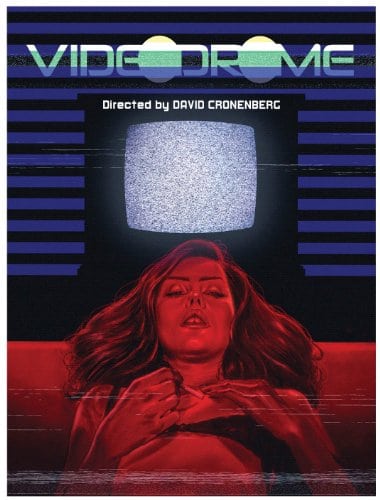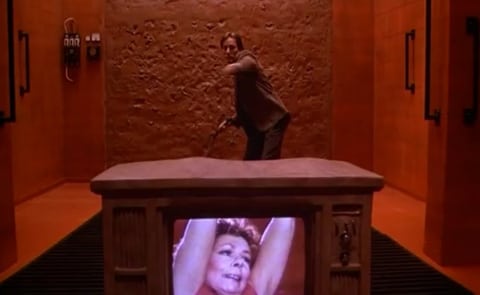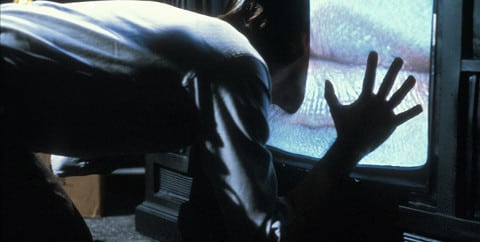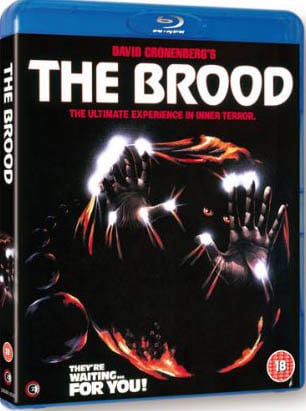Videodrome (1983)
Directed by: David Cronenberg
Written by: David Cronenberg
Starring: Deborah Harry, James Woods, Peter Dvorsky, Sonja Smits
Canada
ON DUAL FORMAT BLU-RAY AND DVD: Now, from ARROW ACADEMY
RUNNING TIME: 87 min
REVIEWED BY: Dr Lenera, Official HCF Critic
Max Renn is the president of CIVIC-TV, a small Toronto-based TV channel that specializes in sensationalistic programming. Max wants his station to offer something that others don’t and is looking for something that will break through to a new audience. He stumbles across Videodrome when one of his colleagues picks it up on his pirate satellite dish which can intercept international broadcasts. Videodrome seems to consist solely of people being tortured and murdered. It initially appears to be being broadcast from Malaysia, but is actually coming from Pittsburgh. Max becomes sexually involved with Nicki, a psychiatrist who loves pain and is aroused by Videodrome. She goes off to audition for it. Max investigates the programme but seems to begin to hallucinate….
While it’s not quite my favourite David Cronenberg, Videodrome is certainly one of his most important films and in a way is a culmination of the run of films begun by Stereo. While for a while he still worked on projects which shared many of the same concerns, he afterwards focused largely on adapting other people’s work rather than on stuff which he’d dreamed up all by himself. Perhaps he’d exhausted his wellspring somewhat, hardly surprising the flood of bold, even transgressive, ideas which this fascinating series of films – and I do consider it a series because the individual movies link together so well and seem to exist in the same universe – provide. Videodrome takes some of these ideas almost as far as a ‘commercial’ [though such a term is stretching it] film can go with them, and in the process is so extraordinarily predictive of the way things were going, and are now, especially in terms of the way our reality is largely shaped by digital media, that one wonders if he had some kind of time machine. The technology in Cronenberg’s 1983 film may seem clunky and outdated to our eyes, but the film is incredibly pertinent to our age nonetheless, with the result that in most other ways the film hardly seems dated at all. This film is a warning to a world which has seemingly ignored said warning, but, as usual with this always thoughtful [even in his supposedly ‘schlocky’ films] filmmaker, there’s much ambiguity about some of the issues, and there’s no sense of preaching in a film which is most enjoyed as a very twisted, mind-bendy thriller where you have to guess much of what’s going on. Successive viewings do make things a little clearer, but inticiing mysteries remain.
It was inspired by Cronenberg picking up TV signals as a child from the US late at night after the Canadian stations had gone off the air, and worrying that he might see something disturbing not meant for public consumption. His first draft, entitled both Zonekiller and Network Of Blood at different times, and which was the one the cast first read, was even weirder than the film we have now with numerous surreal effects scenes like Max’s TV rising up out of his bathtub, and his and Nicki’s faces melting together into a single object that dribbles down, crawls across the floor and up the leg of an onlooker to melt him, which had to de dropped due to cost, difficulty, and Cronenberg’s decision to tone things down. There was even an epilogue planned in which mutated sex organs come out of the main characters. Throughout the Toronto-based production, Cronenberg wrote new scenes and rewrote old ones, and new sheets were distributed to crew members regularly. In fact, the writing of Videodrome continued up until the very last day of shooting, and even after that there were reshoots brought about by a new ending which was actually star James Woods’ idea. The MPAA unsurprisingly insisted on cuts to the Videodrome broadcasts and the violence for an ‘R’ rating, though they were minimal, unlike the UK video version which was cut by its distributors by nearly three minutes, notably cutting down Nicki’s sadomasochistic cravings to almost nothing plus most of the violence. Videodrome was, also unsurprisingly, a major flop at the box office and not much liked by the critics either.
For the first half of its duration, Videodrome plays like a casually paced mystery thriller as Max first views Videodrome, and then investigates to try and find out what Videodrome actually is. He’s initially keen on putting it on his channel, tiring of the soft, tame stuff people keep bringing in. He wants “something tough, something that’ll break through”. He’s almost Cronenberg himself when he defends CIVIC-TV’s exploitative output as being “a positive outlet for their fantasies and their frustrations” and even being “socially positive”. However, he can’t watch Videodrome for long and has to switch if off. Even in the full version of the film, the Videodrome clips are brief, but detailed enough to get the general idea, and you can almost say that Cronenberg was predicting the recent trend for ‘torture porn’ here, not a trend I think an entirely positive thing. I’ll sit through most things, but there some moments in the Saw films that I really found uneasy and questionable considering they were being provided as mass entertainment, and I even found it a little worrying that the films were so popular. Max meets Nicki on the chat show, and the film’s only amusing moment had them being one step away from being all over each other on TV. Max seems a little bit taken aback that she’s turned on by Videodrome, but then she likes pain, and gets Max to stick needles in her ear and a cigarette on her chest. It’s no wonder that these scenes, though unexplicit sexually, were much censored, especially as the whole relationship seems so joyless and emotionless, something enhanced by Howard Shore’s very clever, murky scoring. Nor are we far from Cronenberg’s car accident loving folk in Crash.
Even though Cronenberg paces the first half of his film quite slowly, there’s a palpable and disturbing feeling of mystery which keeps one hooked. In particular, there’s Professor Brian O’Blivion, a pop culture analyst and philosopher whose name is mentioned as being connected with Videodrome. He will only appear on television if his image is broadcast into the studio, onto a television, from a remote location. Then again Cronenberg fills his film with odd and interesting characters, like his middle-aged researcher Masha who finds Max a little too old for her, even if we become unsure of what many of their roles are. Max’s hallucinations, which first start when he imagines himself and Nicki having sex in the Videodrome torture room, soon become more and more prominent and it’s here that the film goes off the rails for some as we’re not sure what is happening and whether it actually is happening at all, though it’s not a problem for me as Max doesn’t have a clue what’s going on either. On the most basic level, it seems that two opposing forces are battling for control of Max’s psyche, but I won’t reveal any of the story as, if this is the first time you’ve seen Videodrome, your interpretation, especially of the ending, could well be very different to mine. It’s best to just enjoy the mind trip and think about it all afterwards, especially with Rick Baker’s special effects expertise in full flow, including exploding bodies and tapes being put in chests. My favourite scene of this nature is quite early on when everything in the room appears to throb with sexual pleasure: it’s just so bizarre, so audacious, and so Cronenberg.
The message about TV [which can be updated to digital technology] controlling us is unmistakeable. It was already a concern in 1983, when the popularity of videos snowballed and sex and violence became especially popular. Fast forward to today, and our culture has now become almost entirely absorbed by media. Some people can’t go for more than five minutes without looking at their phone, which is a form of control if ever I saw one. Cronenberg goes further and shows a machine/human mutation that as I write doesn’t seem totally unrealistic. Considering that more and more of us spend more time online than in the ‘real world’, to the point that some kids hardly ever go out anymore because everything they want is accessible on a phone or a computer, I would say that we’re already changing into a different species. Cronenberg doesn’t seem to find it an entirely negative process, but then it’s possible that he may do if he made the film now [though thank goodness we haven’t heard any more about the proposed remake]. In any case, Videodrome is scarier, and more believable, now then it ever was.
This is one of three films [the others being Once Upon A Time In America and Cop] to entirely make the most of James Woods’ brand of nervous, slightly sleazy energy. You just can’t take your eyes off him and he makes the viewer believe what he imagines is happening to him. Meanwhile Deborah Harry [aka Blondie] is such a full blown sexual presence in this film that I don’t know why she didn’t do more roles like it. Cronenberg’s films are rarely noted for their look and their cinematography, but hereMark Irwin gives us some superb film noir-like photography expertly using shadows and, especially, the colour blue. Meanwhile Howard Shore’s brooding score expertly mirrors the film by having orchestral sounds gradually being taken over by electronic ones. I’ll admit, I wasn’t too keen on Videodrome when I first saw it back in the late 80’s, but for me it’s the kind of film that gets better each time you watch it and I now really like the thing, even if its coldness prevents me from loving it as much as The Brood, The Fly and Dead Ringers which have a heart to them, even if two of those cases it’s an extremely dark one. But I do think that Videodrome, even if parts of its story may not seem to be totally worked out, may eventually become Cronenberg’s most defining work. We’re already there, it’s happening, and, like Max, we seem to have no choice but to submit.
Rating: 









Arrow’s Region B Blu-ray of Videodrome uses the same superbly restored print as Criterion’s Region A release. The only minor flaw I could spot was some of the blacks seeming a bit greyish to me. Otherwise the 1983 film looks amazing with no evidence of uneven grain distribution which is often noticeable on older Blu-rays. For the first time I was truly able to appreciate the film’s superb photography. The limited release, which I think is an essential purchase for simply anyone who looks at a website called HorrorCultFilms, retains most of the extras on the Criterion but substitutes some for others. We don’t get to hear Cronenberg, Woods and Harry on commentary tracks, Arrow presumably not being able to used the tracks, but movie expert Tim Lucas, a guy I’ve loved listening to since his Mario Bava commentaries, is a more than adequate replacement, his tracks bring some of the best in the business. The set also benefits from the inclusion of Cronenberg’s pre-Shivers work [the two feature films of which I reviewed a few days ago] and some extra scenes which were deleted from the final cut of Videodrome but were included in a US TV version. Most are just uninteresting extensions of scenes, but we do get a bit more explanation of Videodrome, which is interesting, though I think Cronenberg was wise to remove it. All in all Arrow again have really pushed the boat out here.
SPECIAL FEATURES
* Original uncompressed mono audio tracks for all films
* Optional English subtitles for the deaf and hard of hearing for all films
* Limited Edition packaging, fully illustrated by Gilles Vranckx
* Limited Edition Exclusive Extras
VIDEODROME – BLU-RAY DISC 1 AND DVD DISC 2:
* Restored high-definition digital transfer of the unrated version, approved by director David Cronenberg and cinematographer Mark Irwin
* Audio commentary by Tim Lucas, the on-set correspondent for Cinefantastique Magazine and author of Videodrome: Studies in the Horror Film
* David Cronenberg and the Cinema of the Extreme – A documentary programme featuring interviews with Cronenberg, George A. Romero and Alex Cox on Cronenberg’s cinema, censorship and the horror genre
* Forging the New Flesh – A documentary programme by filmmaker Michael Lennick on Videodrome’s video and prosthetic make up effects
* Videoblivion: A brand new interview with cinematographer Mark Irwin
* A brand new interview with producer Pierre David
* AKA Jack Martin – Dennis Etchison, author of novelizations of Videodrome, Halloween, Halloween II and III and The Fog, discusses Videodrome and his observations of Cronenberg’s script
* The complete uncensored Samurai Dreams footage with additional Videodrome broadcasts with optional commentary by Michael Lennick
* Helmet Test and Betamax – Two featurettes by Michael Lennick on effects featured in the film
* Camera (2000) Cronenberg’s short film starring Videodrome’s Les Carlson
* Fear on Film: A round table discussion from 1982 with Cronenberg, John Carpenter, John Landis and Mick Garris
* Promotional featurette with behind-the-scenes footage and interviews with Cronenberg, James Woods, Deborah Harry and Rick Baker
Original theatrical trailer
DAVID CRONENBERG’S EARLY WORKS: BLU-RAY DISC 3 AND DVD DISC 4 [LIMITED EDITION EXCLUSIVE]:
* High Definition Blu-ray (1080p) and Standard Definition DVD presentation of four Cronenberg films
* Transfer (1966) & From the Drain (1967), Cronenberg’s previously unavailable short films newly restored by the Toronto International Film Festival [7 & 12 mins]
* Stereo (1969) & Crimes of the Future (1970): Cronenberg’s early amateur feature films, shot in and around his university campus, prefigure his later work’s concerns with strange institutions (much like Videodrome’s Spectacular Optical) as well as male/female separation (Dead Ringers) and ESP (Scanners). Newly restored from original lab elements [65 & 70 mins]
* Transfer the Future – Author and critic Kim Newman discusses Cronenberg’s early works
COLLECTOR’S BOOKLET [LIMITED EDITION EXCLUSIVE]
An illustrated 100-page hardback book featuring new writing including Justin Humphreys on Videodrome in a modern context, Brad Stevens on the alternate versions, Caelum Vatnsdal on Cronenberg’s early works, extracts from Cronenberg on Cronenberg featuring Cronenberg’s reminiscences of getting started in filmmaking and shooting all the films in this collection, plus more, illustrated with original archive stills








Cronenberg tapped into the best horror/sci-fi